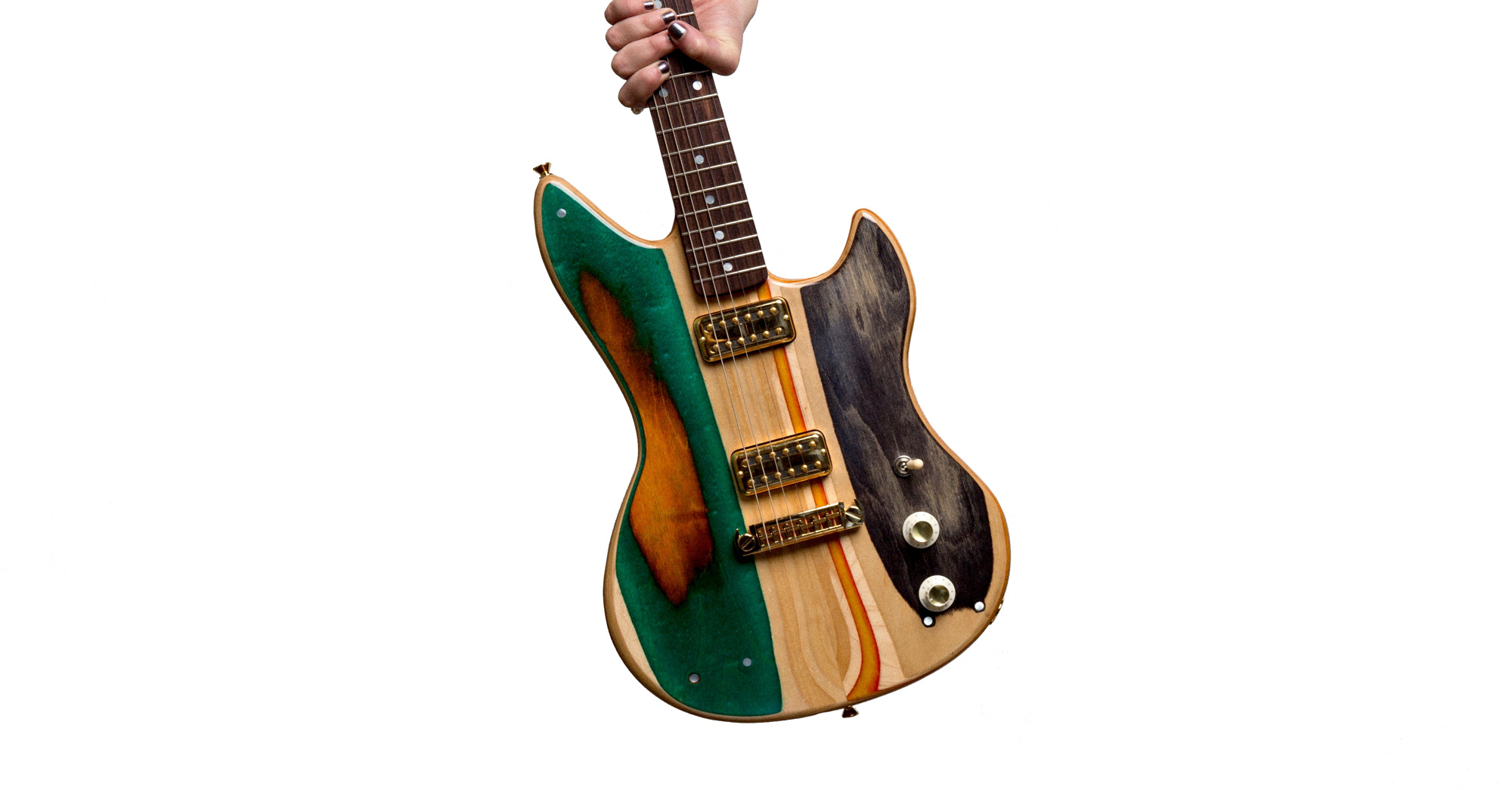We caught up with skater and luthier Nick Pourfard of San Francisco-based Prisma Guitars to chat skating, recycling and why taking the griptape off is the most brutal.
Inspirational stuff.
Find out more at their website: Prisma Guitars
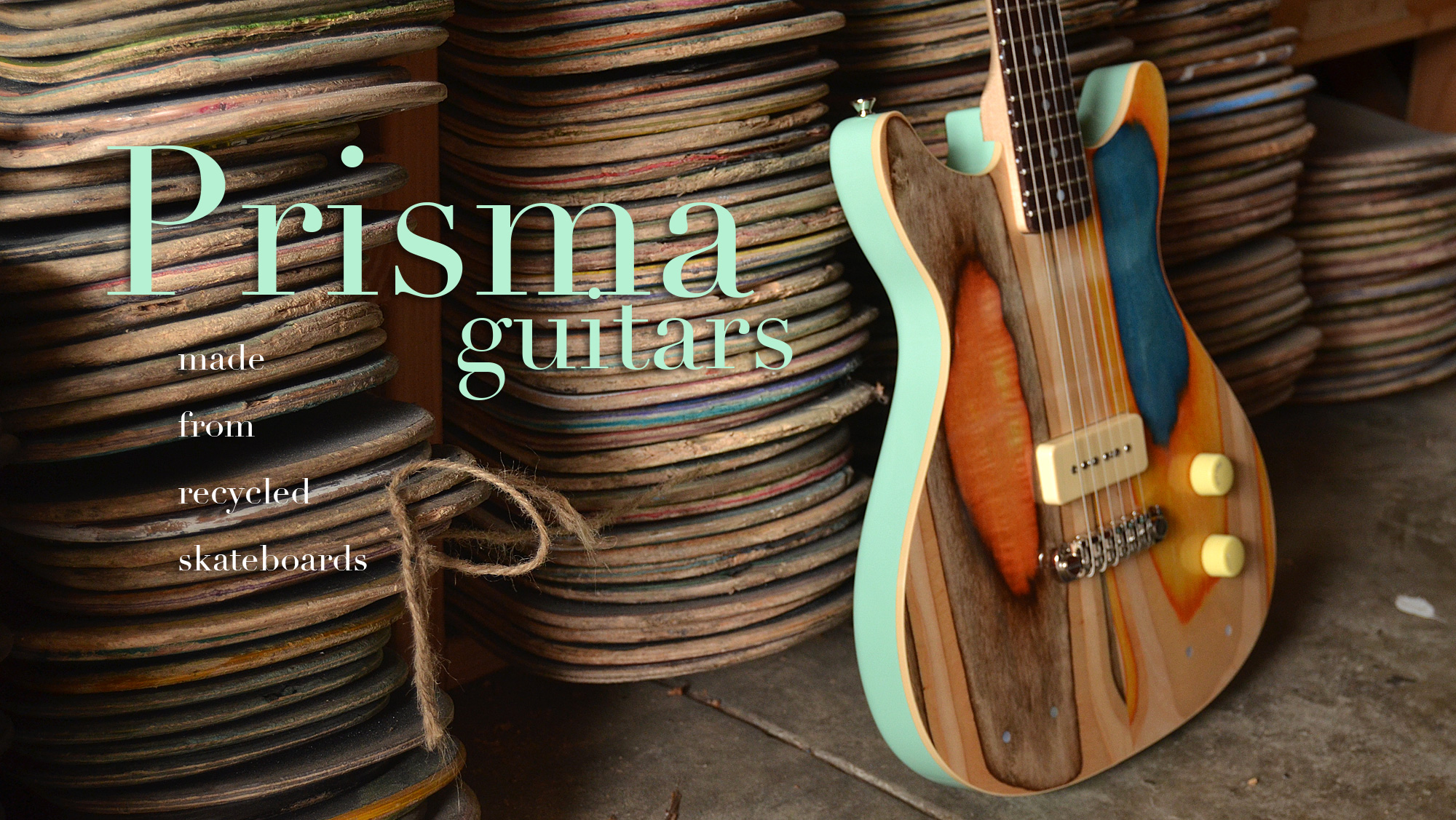
We caught up with skater and luthier Nick Pourfard of San Francisco-based Prisma Guitars to chat skating, recycling and why taking the griptape off is the most brutal.
Inspirational stuff.
Find out more at their website: Prisma Guitars
I read in your Reverb interview that you initially started building guitars from recycled skateboard decks as a consequence of an injury that left you immobile for some time – dare I ask if it was a skate-related injury that set you off on this path?
Yeah, that’s exactly what happened. I was part of a DIY project by my house. We concreted a little kicker thing from a water drainage ditch into the street. I guess I was a little eager to skate it, so I went there about two days later to try it out and had some success until I rolled my ankle pretty badly. I ended up tearing some tendons that left me unable to walk for a good portion of the year.
I didn’t even know it was that bad at first. I had my buddy drive me to school to take a test right after it happened!
Luthiery was something you’d had some involvement in prior to setting up Prisma in 2014 though, right? You’ve been building guitars for a long time, haven’t you?
Yeah I have been building guitars since 2010. I started up the business later, once I got all the kinks worked out. I never at any point thought I would start a business building guitars though: this idea was solely birthed on fun and curiosity to learn.

You’ve been skating and playing guitar for a long, long time too – were both those hobbies birthed at the same kind of time in your life?
I started playing guitar at the same time as I started skating. I think I was 13. The two hobbies go pretty much hand in hand. You do what you want, not what someone tells you. You get creative.
Is there anything similar to carbon-fibre skateboard deck technology within luthiery? Have you personally built any guitars using decks with that kind of tech in them?
I have buddies who use carbon-fibre in their instruments as a way to add strength and stability. I personally find it unnecessary or excessive in both skating and guitar building. However, I encourage all sorts of experimenting and innovation regardless of the end result. It can only help in the end.
I actually don’t end up using any of the carbon-fibre boards that are donated though as they’ve damaged my tools in the past. I feel like it’s best to just leave them alone.
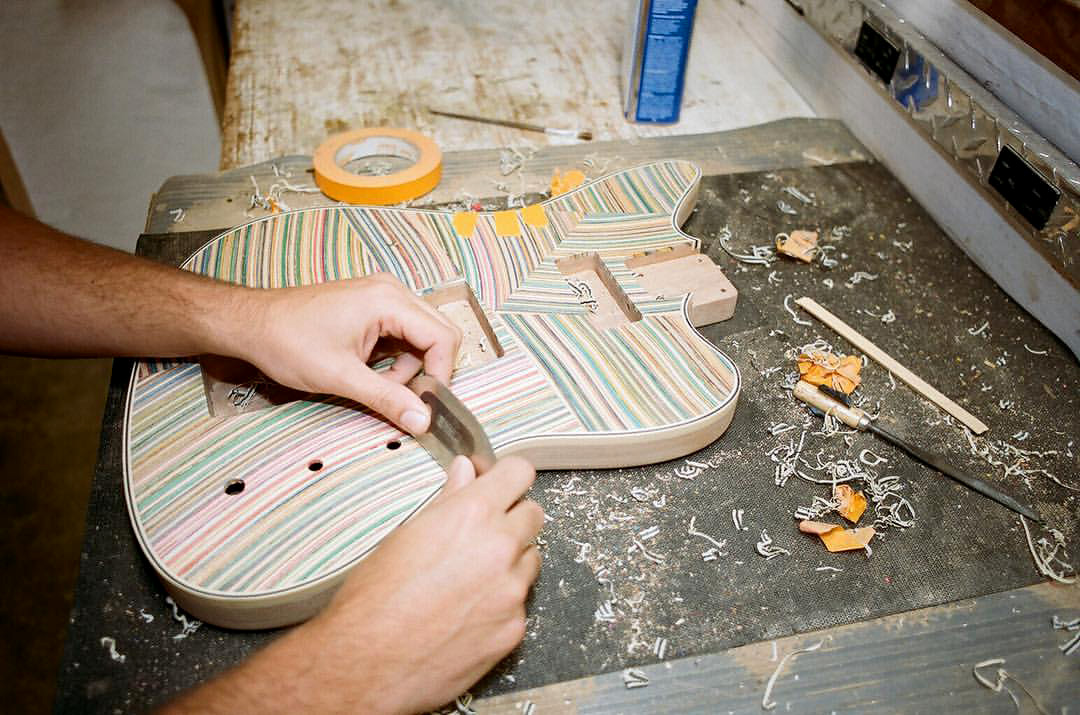
You’ve spoken before about how you feel that the guitars you build from skateboards kind of absorb the echoes or stories from the previous life of the wood prior to it becoming a guitar body – could you elaborate on that?
Sure. I have had boards donated that are from pros, are abnormally broken, have drawings all over the grip, or are covered in blood. There is plenty to infer from this. You can kind of imagine what happened on the board, if it was a good day or a bad day, or just think about the joy it brought someone. This idea is cool to me because it will continue to produce more stories in its new form as a guitar.
I personally have a couple guitars loaded with all the boards from my friends and my childhood. That means so much more to me now than just any old guitar to play.
Another example is that Wes Kremer just sent up a stack of boards for me to build with. We are from the same hometown. He got on the phone with me and explained that some of these boards meant a lot to him and he had kept them for years as mementos. He said there were one or two that Peter Smolik had given him back in the Shortys days and there was another board in his donated pile which he’d skated the first time he kickflipped this stair-set by his house (it was kind of his training ground). To think that I will be creating something new that he can appreciate, use, and still feel that same sentimental attachment to is awesome.
I have some of Marius Syvanen and Tyler Surrey’s boards in the shop right now too. They are all buddies from childhood, so I may just sneak some of those in there as well!
You work out of SF so I’m assuming that sourcing donations of skateboards isn’t a problem. Do people approach you or do you just turn up at a skatepark and collect them or what?
Everyone in SF is super-supportive! I’m from San Diego originally so I get help from there as well. Distributors, skate shops, skaters, skateparks, and even fellow board recyclers. Typically people will call me first, or if I know them already, will drop them off at the shop.
The skate industry and community as a whole globally has been supportive and I am very grateful for that.
Is it true that a lot of guitar bodies are constructed from Hard Rock Maple already? Is there something intrinsic to that particular wood that makes it work for both guitars and skateboards?
Guitars have been made with maple forever, so what I am doing is not foreign to the build process. The wood is dense and stiff, which makes it perfect for guitar necks and the weight will add sustain!
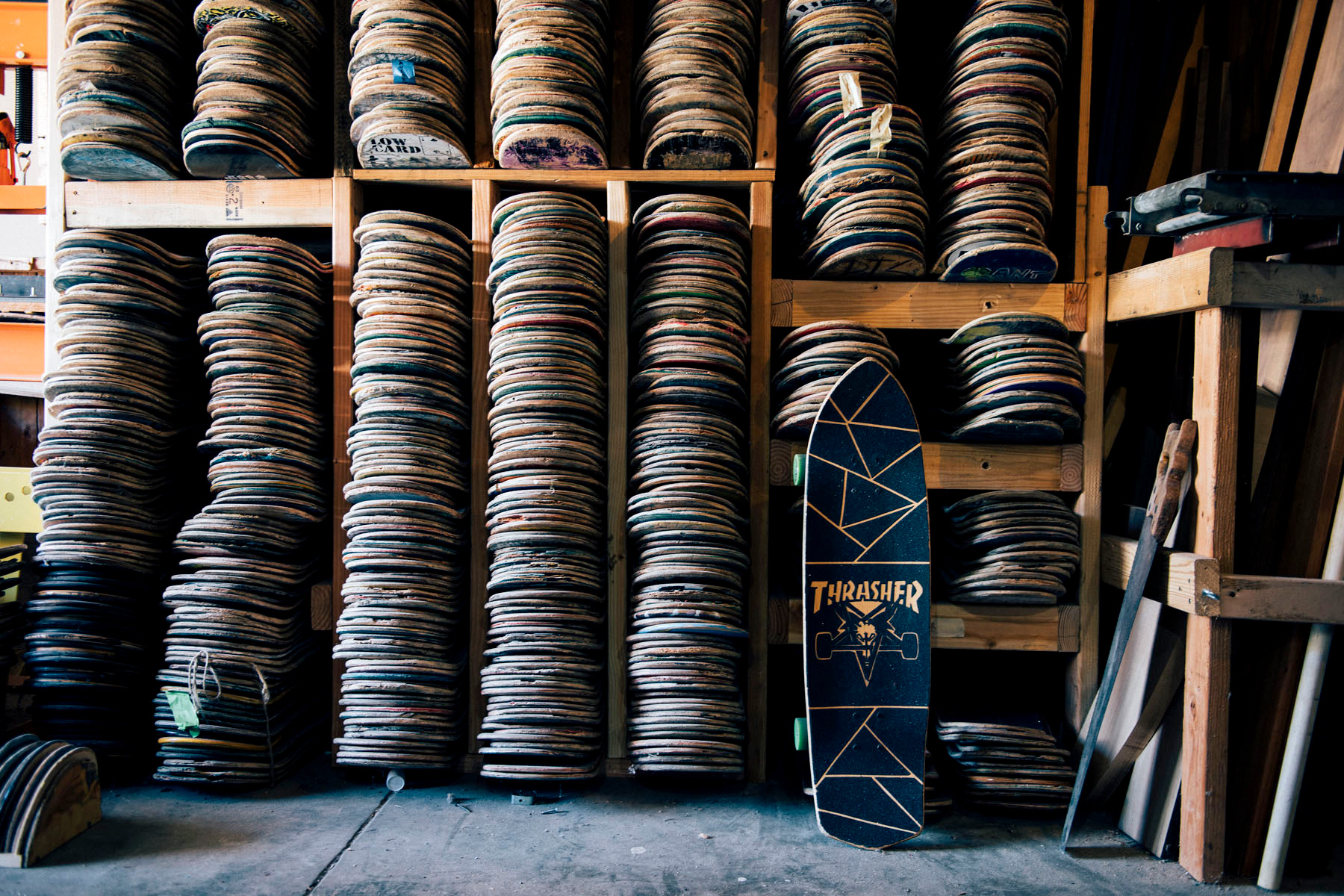
How is the process of going from a pile of donated old skateboards to a finished guitar body compartmentalized – how many different stages are there?
It takes about 3 days to get the raw boards to become a usable block of wood. At that point my process is the same as any other guitar builder. I begin cutting, drilling, sanding, etc.
Once the body is done, you finish it with lacquer and then assemble!

Which aspect is the worst?
Taking griptape off is pretty brutal. There are times where my fingers hurt so bad from it that I can’t even play guitar. However, I have sort of learned to enjoy this. This is the most quiet and relaxing stage. I just sit outside and get at it.
Believe it or not, the guitar painting process is the worst stage by far. Many hours are spent to get the mirror-like look you are used to seeing.
How long does it currently take you to go from the raw material to the finished product?
All in all, it takes about 20 hours to complete a guitar, but this happens over a month with plenty of other guitars.
How many people currently work at Prisma and how is the workload shared out?
There are four of us. Two of us woodwork and two of us are guitar techs. This helps keep things moving.
Did you meet with any resistance from traditional musicians regarding using recycled boards? Was it viewed as more of a novelty before people actually tried playing the guitars?
Definitely! More so than people viewing my process as a novelty, people looked at my age as a sign of me not being experienced. It’s crazy to think how long it took for traditional people to give me some credit or play anything I built.
Nowadays, our brand and product is better recognized in the industry and I am pretty tight with most of the guitar companies and builders!
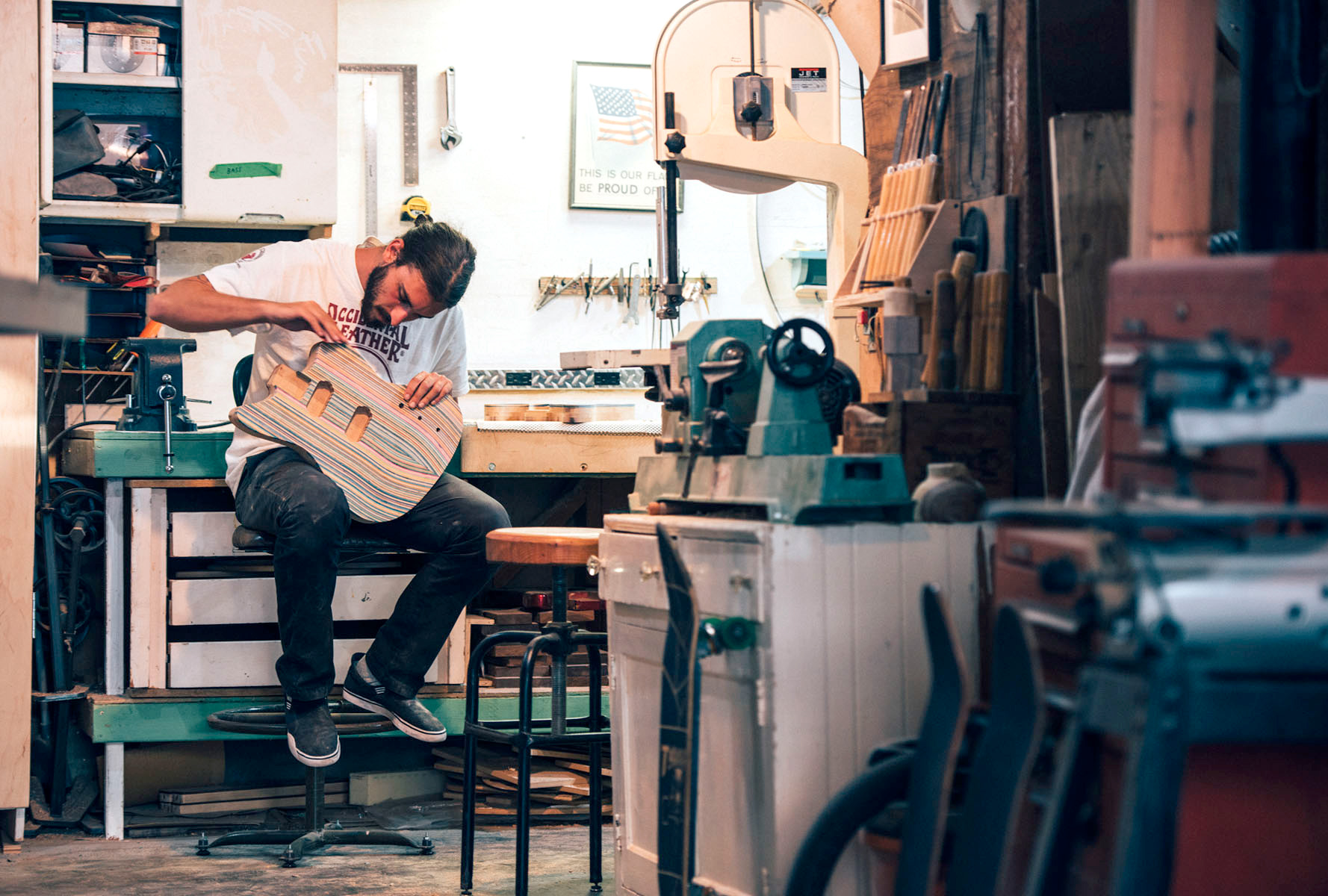
How significant is the recycling aspect of what Prisma does from your own perspective? In terms of the overall philosophy of what you do I mean?
From my own perspective, recycling is a bi-product of what we do. This started from curiosity and to create something one-of-a-kind that you couldn’t already buy in the store. Although nice, I had no intentions to keep boards from the landfill.
Being honest, the farther I can take my design process towards making the final material look less like a skateboard, the better. I want people to appreciate the guitars prior to knowing the story or process. I get more enjoyment this way. I feel more appreciated as a builder in that regard.
Any left over scraps, I give to friends or build fun stuff with from time to time!

Have you ever made a guitar purely from your own recycled decks? If so, did you keep it for yourself?
I have! I don’t think I could ever sell it! I used all the boards I have ever skated in my childhood.
Is there a way of people finding out which boards were used to build their guitar after its finished? Like the provenance of the donations or something?
If someone donates, I try to remember which boards were used in what guitars to let them feel like this is something we made together. They helped me out, so it is the least I could do.
You sponsor Figgy too, right? How does that work?
I wouldn’t say ‘sponsor’… Figgy called me back before I was “Prisma” to make him a guitar. He came and dropped off some boards and I got at it. I was so hyped to make him something because he rips on guitar too. I ended up starting the company right after I made his guitar. I guess it was all kind of because of him in a way!
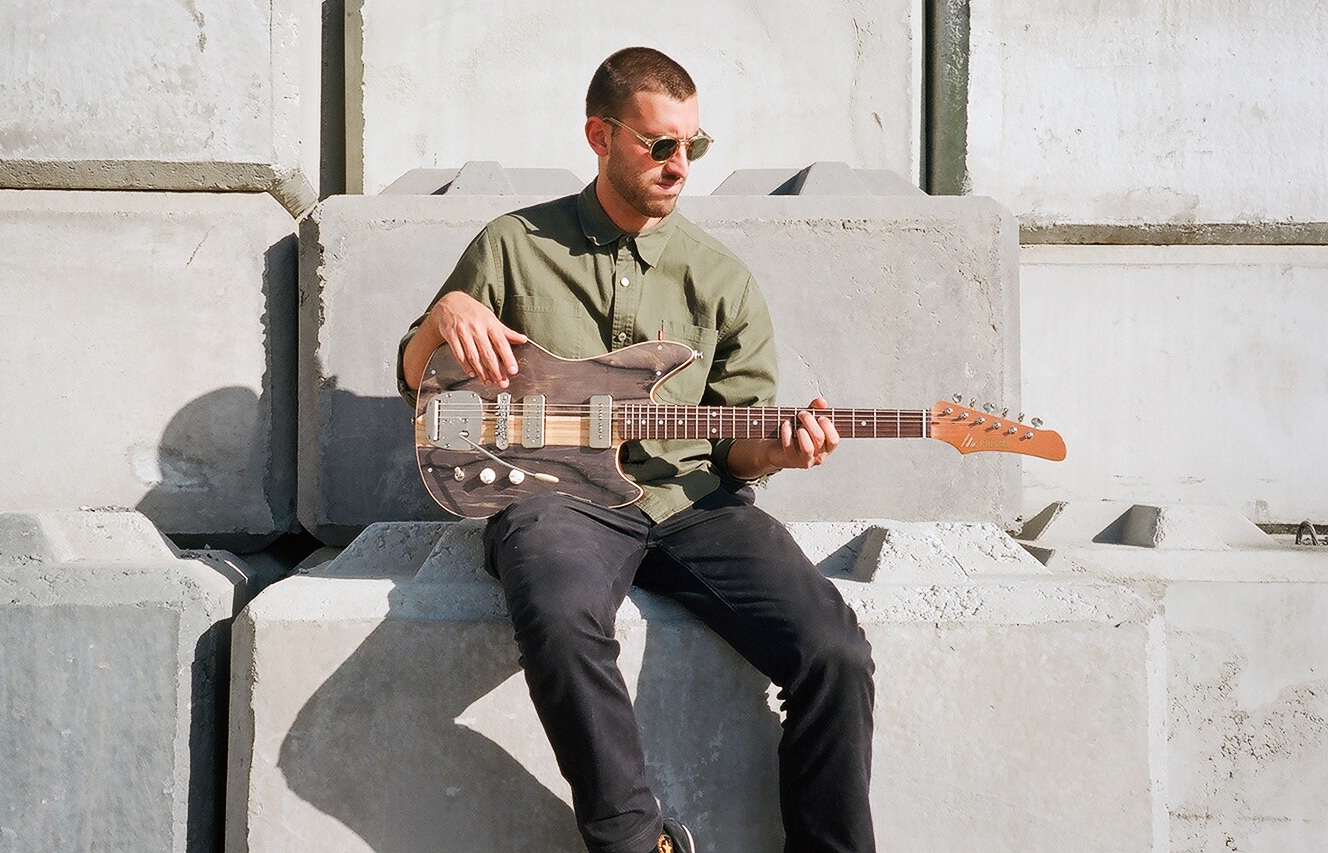
How do you see Prisma developing from this point?
I am trying to come up with some new designs and patterns lately. I have plans for acoustic builds and also some more subtle uses of the material.
I am trying to pick up international representation in stores and things like that as well. We just got in with James’ Home of Tone in the UK so our guitars are now available over there too.
Do you have any advice for anyone out there considering working with recycled skateboards in whatever capacity?
You gotta fuck up a lot to know what these laminations like and don’t like, what tools to use and not use. I’d say to anyone who wants in, to just experiment. All it takes is your vision, motivation, and patience.
P.S. shout out to South Bank! Most OG spot on earth!
-Nick
